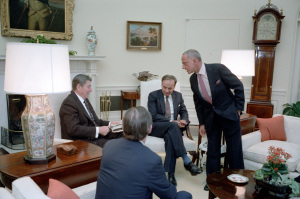Reprinted from Consortium News
Rupert Murdoch, the global media mogul who is now a kingmaker in American politics, was brought into those power circles by the infamous lawyer/activist Roy Cohn who arranged Murdoch's first Oval Office meeting with President Ronald Reagan in 1983, according to documents released by Reagan's presidential library.
"I had one interest when Tom [Bolan] and I first brought Rupert Murdoch and Governor Reagan together -- and that was that at least one major publisher in this country ... would become and remain pro-Reagan," Cohn wrote in a Jan. 27, 1983 letter to senior White House aides Edwin Meese, James Baker and Michael Deaver. "Mr. Murdoch has performed to the limit up through and including today."
In a photograph of the Jan. 18, 1983 meeting, Cohn is shown standing and leaning toward Reagan who is seated next to Murdoch. Following that meeting, Murdoch became involved in a privately funded propaganda project to help sell Reagan's hard-line Central American policies, according to other documents. That PR operation was overseen by senior CIA propaganda specialist Walter Raymond Jr. and CIA Director William Casey, but the details of Murdoch's role remain sketchy partly because some of the records remain classified more than three decades later.
However, at my request, the Reagan Presidential Library in Simi Valley, California, released a batch of documents about Roy Cohn's contacts with the Reagan White House. Most of the documents revealed a warm personal relationship between Cohn and Reagan, with exchanges of effusive compliments, handwritten thank-you notes and birthday greetings.
Both Cohn and Reagan got their starts in politics during the anti-communist purges in the 1950s, Cohn as Sen. Joe McCarthy's chief counsel and Reagan as a witness against alleged communists in Hollywood. Cohn, a hardball political player, built his reputation as both an anti-communist and anti-gay crusader who aggressively interrogated witnesses during the Red Scare and the Lavender Scare, claiming that the U.S. government was infiltrated by communists and homosexuals who threatened the nation's security.
Cohn's high-profile role in the McCarthy hearings ultimately ended when he was forced to resign over charges that he targeted the U.S. Army for an anti-communist purge because it had refused to give preferential treatment to one of his close associates, G. David Shine. Though Cohn denied he was romantically involved with Shine -- and a homosexual relationship was never proven -- Cohn's own homosexuality became publicly known after he underwent treatment for AIDS in the 1980s, leading to his death in 1986.
However, in the years before he died, Cohn gained some measure of revenge against his liberal enemies by helping to elect Ronald Reagan. Roger Stone, another Cohn associate, has asserted that -- at Cohn's initiative -- he delivered an apparent bribe to a leader of New York's Liberal Party in 1980 to arrange the endorsement of independent candidate John Anderson, who then siphoned off 7.5 percent of the vote and opened the way for Reagan to carry New York against President Jimmy Carter.
Stone described the transaction in a 2007 article by Matt Labash in The Weekly Standard, with Stone noting that he was speaking only after the statute of limitation on bribery had run. Stone described a discussion with Cohn about a $125,000 cash payment "to grease the skids" for the Liberal Party's endorsement of Anderson and then recounted Cohn's instructions that he deliver a suitcase to a law office two days before the Liberal Party, indeed, did endorse Anderson.
Cohn's Murdoch Ties
Whatever Reagan's personal knowledge of that scheme, the conservative Republican President subsequently lavished favors on Cohn, including invitations to White House events, personal thank-you notes and friendly birthday wishes. But perhaps nothing was more important to Reagan than Cohn's ability to deliver Murdoch, then an Australian citizen, as a stalwart media ally.
According to the documents from the Reagan library, Cohn's relationship with Murdoch apparently developed around their mutual commitment to Israel. For instance, one set of documents described Cohn's intervention with Reagan to get the President to praise Murdoch's 1982 receipt of an award from the American Jewish Congress as its first "Communications Man of the Year."
Handwritten notes cite Murdoch's "steadfast support of Israel + free + outspoken support of free press" and point to Cohn as the contact. On April 20, 1982, Reagan extended his and his wife Nancy's congratulations to Murdoch.
Cohn, a notable socialite, further ingratiated himself to Reagan's insiders by co-hosting a lunch on June 28, 1982, for USIA Director Wick, which also counted as guests Roger Stone and the New York Post's Niles Lathem, according to a document.
By late 1982, the Reagan administration was gearing up for an expanded propaganda push in support of the President's hard-line policies in Central America, including support for the Salvadoran and Guatemalan militaries -- both notorious for their human rights violations -- and for the Nicaraguan Contra rebels who also were gaining an unsavory reputation for acts of terrorism and brutality.
This PR campaign was spearheaded by CIA Director Casey and Raymond, one of the CIA's top covert operation specialists who was transferred to the National Security Council staff to minimize legal concerns about the CIA violating its charter which bars influencing the American public. To further shield the CIA from possible fallout from this domestic propaganda operation, Casey and Raymond sought to arrange private financing to pay for some activities.
(Note: You can view every article as one long page if you sign up as an Advocate Member, or higher).






